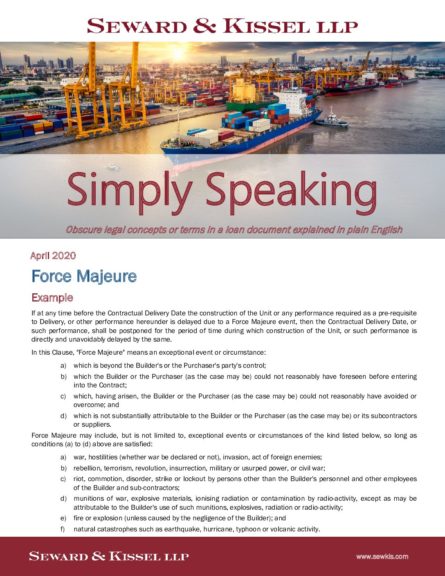
Force Majeure
Example
If at any time before the Contractual Delivery Date the construction of the Unit or any performance required as a pre-requisite to Delivery, or other performance hereunder is delayed due to a Force Majeure event, then the Contractual Delivery Date, or such performance, shall be postponed for the period of time during which construction of the Unit, or such performance is directly and unavoidably delayed by the same.
In this Clause, “Force Majeure” means an exceptional event or circumstance:
- which is beyond the Builder’s or the Purchaser’s party’s control;
- which the Builder or the Purchaser (as the case may be) could not reasonably have foreseen before entering into the Contract;
- which, having arisen, the Builder or the Purchaser (as the case may be) could not reasonably have avoided or overcome; and
- which is not substantially attributable to the Builder or the Purchaser (as the case may be) or its subcontractors or suppliers.
Force Majeure may include, but is not limited to, exceptional events or circumstances of the kind listed below, so long as conditions (a) to (d) above are satisfied:
- war, hostilities (whether war be declared or not), invasion, act of foreign enemies;
- rebellion, terrorism, revolution, insurrection, military or usurped power, or civil war;
- riot, commotion, disorder, strike or lockout by persons other than the Builder’s personnel and other employees of the Builder and sub-contractors;
- munitions of war, explosive materials, ionising radiation or contamination by radio-activity, except as may be attributable to the Builder’s use of such munitions, explosives, radiation or radio-activity;
- fire or explosion (unless caused by the negligence of the Builder); and
- natural catastrophes such as earthquake, hurricane, typhoon or volcanic activity.
What is it and what does it do?
A force majeure clause in a contract may free a contracting party from performing its obligations when an extreme and unforeseeable event beyond a party’s control occurs. The clause originated under French law, the phrase being literally translated as “superior force”.
The burden of demonstrating the occurrence of a force majeure falls upon the non-performing party seeking excusal. Such party may need to prove what it did to overcome the event and mitigate its effects. Generally under New York law, courts tend to narrowly construe the clause, meaning that there may be a requirement to prove that the event in question is specifically identified in the contractual clause and was truly not foreseeable or contemplated by either party.
Why is it there and how is it relevant to shipping?
A force majeure clause is included in a contract where certain events outside either party’s control are likely to have a material impact on the affected party’s ability to perform and where parties agree, as a contractual matter, such events should excuse that party’s non-performance. A shipbuilding contract is a good example where an extreme and unforeseeable event such as a flood, strike or epidemic, while unlikely, can materially delay the construction of the ship and prevent the shipyard from meeting the agreed-upon delivery date without any fault or misconduct on their part. A shipyard’s liability in respect of a delay caused by the COVID-19 pandemic, for instance, could be drastically different, depending on the existence and precise language of the force majeure clause; shipowners and shipyards experiencing such construction delay are advised to review carefully the relevant contractual language and notice requirements. The words such as “pandemic”, “epidemic”, “disease” or “quarantine” would be a helpful signal in determining whether the clause is applicable.
Importantly, a force majeure clause is an express clause, meaning that the contracting parties must affirmatively include it in a contract. If the contract does not contain a force majeure clause, it cannot be implied. There may be other legal theories under which a party may attempt to be excused from its non-performance, such as the doctrine of frustration of purpose or the defense of impossibility of performance, but different standards and analyses would apply.
How is it negotiated?
As an express clause in a contract, the specific language of the force majeure clause is critically important. Very often, the phrase force majeure is defined in great detail. Whether the event in question is specifically referenced in the force majeure definition is one of the most important factors in determining the applicability of the clause. Hence, the parties should give careful consideration to the enumerated events within the definition and the market norms.
While it is entirely up to the contracting parties, the decision to include a force majeure clause is often driven by precedents or market norms. Notably, loan agreements typically do not have it, while most shipbuilding contracts have the force majeure clause.
The force majeure clause could sometimes be a double-edged sword, in that if an event is capable of invoking the clause, it may give either party an ability to terminate the contract or be excused from its non-performance. Therefore, a broad force majeure definition could potentially hurt a party’s position as much as it can help.
